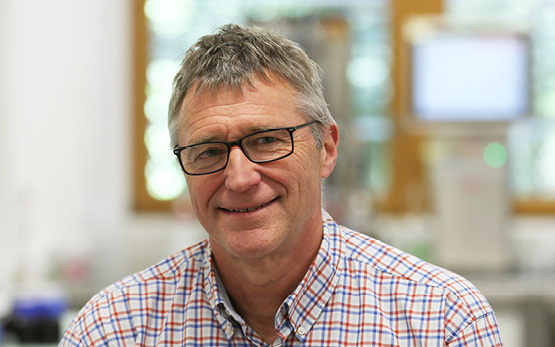Had there been internet and email back in 1985, who knows – perhaps everything would have turned out differently and Michael Winzeler (b. 1956) would have wound up in Australia. After completing his PhD dissertation he had applied for two posts: one in Adelaide, Australia, the other in Guelph, in the Canadian province of Ontario. “I actually decided on Canada because of time constraints – the snail-mail response from Adelaide was too long in coming” he recalls. Although the University of Guelph offered to extend his postdoctoral stint, Michael Winzeler returned to Switzerland after two years to take up a position as a Senior Research Associate at the ETH Zurich. Meanwhile, he didn’t stick to basic research for long: Just over a year later he became Head of the ‘Wheat Breeding’ Research Group at the former Research Institute for Plant Production in Reckenholz. In 2000, after a fairly major reorganisation of agricultural research, he set up the new Agroscope ‘Eco-Controlling’ Research Division, which was expanded into the ‘Biodiversity and Environmental Management’ Research Division from 2008. And now, in 2017, as a Member of the Agroscope Executive Board, Michael Winzeler is responsible for the ‘Plant Breeding’ Research Division.
All this time, plant breeding was his primary focus: a wide-ranging field with numerous exciting issues, such as what plants were to be bred in Switzerland with public funding. Michael Winzeler is particularly pleased that the Swiss Federal Council also recognised the importance of the topic with its ‘Strategie Pflanzenzüchung 2050’ (= Plant-Breeding Strategy 2050). It still remains to be seen how this strategy will be implemented, and Michael Winzeler awaits the state government’s decision with anticipation. Plant breeding has, however, attracted its fair share of controversy, focusing on Reckenholz, where genetic engineering is an important subject. How is the researcher Winzeler influenced by the often highly emotional discussions on genetic engineering? “My job is to make knowledge available” he says, but confesses that it troubles him “when scientific findings are misused in political discussions”.
Michael Winzeler’s professional career gives the impression of having been carefully planned. “No” he says, “the only strategic decision was to do a year-long internship at Reckenholz before writing my PhD thesis.” Then, he says, he simply put in the requisite effort whenever an opportunity arose. For him the recurring theme was always plant breeding – an interest that arose in his earliest years when, along with his father, he would help farmers in Wigoltingen (canton of Thurgau) load sheaves, “all still with a horse and cart”. This connection with plants was also passed on by him to his two sons during the Sunday family walk. His sons, however, have chosen other career paths – one became a primary school teacher, the other went into banking and finance.
Today, Michael Winzeler lives in Wettingen with his wife, an agronomist who retrained as a primary school teacher – and breeding research is still his main focus. He’s swapped his work in the field for management duties at four different workplaces: Reckenholz, Wädenswil, Changins and the railway dining car. Wisely, he refuses to say which is his favourite. There is no hesitation, however, in answering the question as to which is the most demanding. As at the beginning of his career, it is still Reckenholz – only the former intern is now the site manager.
What about when he reaches retirement age in four years’ time? Michael Winzeler doesn’t plan on being bored. True, his back isn’t what it once was, so he’s had to give up volleyball after 30 years. On the other hand, he regularly dances once a week. In the last few years he’s begun learning Italian, and he’d like to go deeper into that. And travelling – he plans to take a several-week-long trip every year. And it’s easy to believe him when he says “I’m just going with the flow – after all, there’s so much happening.”






